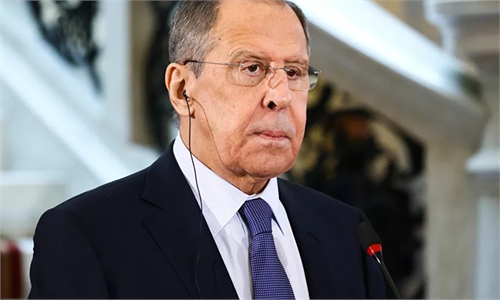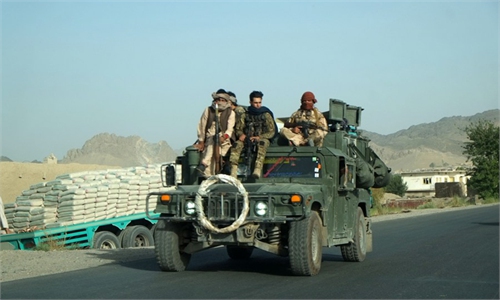China, Pakistan to take joint actions to tackle terrorist spillover from Afghanistan

Afghan security force members take part in a military operation against Taliban militants in Alishing district of Laghman province, eastern Afghanistan, on July 12, 2021. Taliban militants have been intensifying activities to capture more districts, as the U.S. troops are completing the pull-out from Afghanistan. In the meantime, Afghan security forces have been conducting counter-offensives to foil the militant group's efforts.(Photo: Xinhua)
As Afghan-Taliban peace talks failed to reach breakthrough and security threats remain high, Chinese State Councilor and Foreign Minister Wang Yi held a meeting with Pakistani Foreign Minister Shah Mahmood Qureshi in China on Saturday. They have both agreed to take joint actions to tackle the spillover effect from the deteriorating security situation in Afghanistan.China and Pakistan are facing a direct effect from the worsening situation in Afghanistan, and it is one of the important agendas of Qureshi's visit to China to enhance cooperation and deal with the situation, Wang said.
China and Pakistan will pursue the hope for peace in an attempt to prevent a civil war in Afghanistan, and mediate for negotiations between the Afghans, Wang said.
China and Pakistan will jointly combat terrorism, push all major forces in Afghanistan to draw a clear line with terrorism, resolutely crack down on terrorist forces such as the East Turkistan Islamic Movement (ETIM), and prevent Afghanistan from falling again into being a hotbed for terrorism, Wang said. He stressed that there should be a push for cooperation between Afghanistan's neighboring countries to bring peace and stability in Afghanistan.
The meeting was arranged amid "very important and sensitive" time, as the Afghan government and the Taliban failed to reach an agreement, and turbulence within the country is yet to be subdued and is spilling over to neighboring regions, Qian Feng, director of the research department at the National Strategy Institute at Tsinghua University, told the Global Times on Sunday.
On July 14, a terrorist attack on a bus in Pakistan claimed the lives of nine Chinese nationals who worked at the Dasu hydropower station, a joint program between the two countries. Although no organization has claimed responsibility yet, Chinese experts believed that terrorist groups such as Pakistani Taliban or the ETIM were behind the attack.
Due to a changing environment in Afghanistan, the ETIM terrorists may have fled to Pakistan where they collaborated with the Pakistani Taliban to launch an attack on China, some experts have said. But they also warned that if the situation in Afghanistan further deteriorates, Pakistan as well as the China-Pakistan Economic Corridor will be in danger.
Qian said that China, Pakistan and Afghanistan are all important members of the Shanghai Cooperation Organization (SCO), thus the joint action is a way to unite other regional and relevant countries to provide solution for the Afghan situation. "Since a significant solution needs time to put forward, such a small step may serve as a kick starter."
The US' hasty troop withdrawal from Afghanistan neither achieved the anti-terrorism goal, nor brought peace to the country, but created a new security black hole there, Wang said during his meeting with Qureshi.
US President Joe Biden on Friday authorized up to $100 million from an emergency fund to meet "unexpected urgent" refugee needs stemming from the situation in Afghanistan, and allocated $3.3 billion for the security forces of Afghanistan.
In recent days, the US has launched several airstrikes targeting Taliban positions in support of faltering Afghan government forces.
Apparently, the US doesn't want to facilitate stability in the country, as Washington's financial support for the Afghan government will further escalate the country's turmoil, Diao Daming, an associate professor at the Renmin University of China in Beijing, told the Global Times.
Diao also said that if the US is looking for a solution to a stable Middle East, it should unite with Afghanistan's neighboring countries, promote a peaceful reconciliation via dialogue and negotiation.



